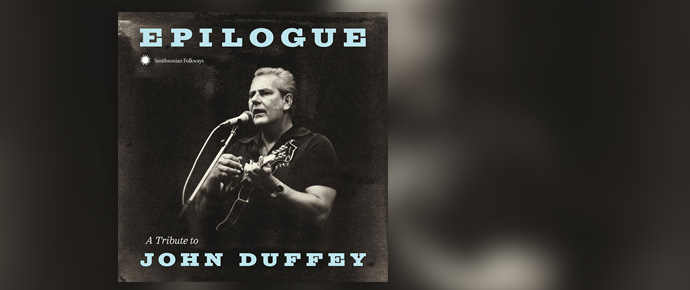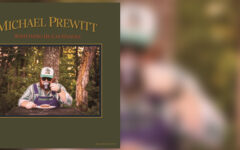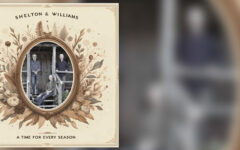
It’s early to start thinking about the 2019 IBMA awards, given that the finalists for this year haven’t been selected yet.
But I already have a frontrunner for next year’s recorded event of the year, the award that goes to a song featuring one or more musicians who don’t regularly play together. Actually, I have a handful in mind, and they all come from one ambitious, powerful, long-in-the making project – Epilogue: A Tribute to John Duffey on the Smithsonian Folkways label. And some strong contenders for other awards, too.
Even if you came to bluegrass yesterday, you’ve probably heard of the late front man from the Country Gentlemen and the Seldom Scene. Duffey died in 1996, but he’s still talked about on stage, backstage, and in jams more than anyone except, perhaps, Bill Monroe and Earl Scruggs. He was, and is, a giant who helped give bluegrass a new direction.
In fact, his staying power as a cultural icon is one big reason why this 17-song project was possible. It’s been about 15 years in the making – not a typo! – becoming a labor of love for Akira Otsuka after his co-producer Ronnie Freeland died a few years back. They were helped along the way by dozens of musicians, including a couple of huge names who found room on their schedules when Duffey’s name was spoken.
Many times, of course, labors of love do not result in top-shelf music. This one is a big exception. In fact, we might need to build a new shelf.
So let’s backtrack to recorded event of the year. Don’t be surprised if the final five more than a year from now includes If That’s The Way You Feel. Ralph and Peggy Stanley wrote it and Ricky Skaggs, among others, took it to the bank. This version, sung by Amanda Smith with Alan Bartram on low tenor, is a keeper. Her husband, Kenny Smith, is on guitar, with Adam Steffey on mandolin, Jason Moore on bass and Nils Lofgren on Dobro. Yes, that Nils Lofgren, the rock and roll hall of famer who plays for some guy named Springsteen.
Or maybe it’s Some Old Day, with John Cowan singing lead, backed by the harmonies of Lou Reid, David Parmley and Shelton Feazell, with instrumental help from Wayne Benson, Kenny Smith, Ronnie Simpkins and Ron Stewart. It’s a fresh sounding bluegrass chestnut that’s sure to get a lot of radio play.
Or maybe it’s He Was a Friend of Mine. Dudley Connell’s haunting lead is backed by Cowan, Parmley and Feazell, with Simpkins on bass, Otsuka on mandolin, Jerry Douglass on dobro and Tony Rice on guitar.
Or, sure to be a sentimental favorite, the late James King singing Going To The Races, written by the late Carter Stanley. Lou Reid and Eddie Adcock, who played with Duffey in the Scene and the Gents, respectively, round out the trio, with David Grier on guitar.
But here’s the thing. It’s entirely possible that this CD will have a finalist that I didn’t name above. The quality of work is that impressive. Maybe If I Were A Carpenter, featuring a vocal trio of Jonathan Edwards, Dede Wyland, and Mike Auldridge. Or Connell’s Lonesome River, with David Grisman playing Duffey’s Gibson F-12 mandolin (as did most of the mandolin pickers on the record). Or maybe Duffey’s own Reason for Being, with Fred Travers singing lead on the verses and Ronnie Bowman out front on the chorus. Or the Don Rigsby-led Ain’t Gonna Work Tomorrow, penned by Charlie and Ira Louvin.
For good measure, there’s an instrumental-of-the-year contender here, too, another Duffey composition called Sunrise. It features Sam Bush on mandolin, Béla Fleck on the banjo, Todd Phillips on bass, and Kenny Smith on guitar. It is, for my money, the crown jewel on a recording filled with gems. That’s saying a lot. I love jazz without words, but I generally prefer lyrics with bluegrass. Picking this powerful might change my mind.
The wonderful music, though, comes with a dose of sadness attached. Duffey and Freeland would have loved this restrospective. But others are gone, too, including King and Auldridge. And Tony Rice is gone from the stage. Foretunately, Otsuka and Freeland were there with their microphones and recording gear to tease some immortal music from the mortals.
And fortunately, Smithsonian Folkways is the label. There aren’t many labels that would go to the trouble and expense of producing a 40-page book of liner notes, credits and tributes. The booklet, alone, is entertaining and informative. So, why not? Let’s put the special award for liner notes in play, too.
As I said, it’s early. And I know some powerful projects are in the works and more will be coming out before next year’s voting begins. But Epilogue has served notice: The competition is stout.







